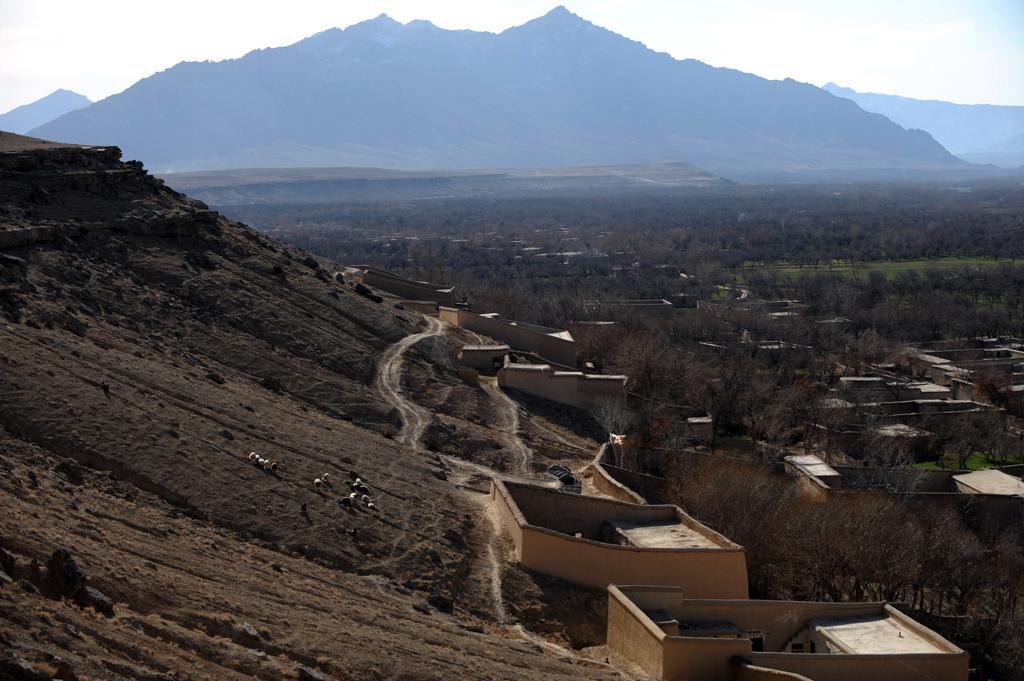Afghanistan’s post-NATO era takes shape
Afghan village houses in Chora valley, southern Uruzgan province.
KABUL, Afghanistan — The nightmare scenario of NATO leaving Afghanistan to face a new period of ethnic violence and civil conflict has already become a reality in the southern province of Uruzgan.
There a militia commanded by a man named Abdul Hakim Shujaee is accused of deliberately destroying houses, raping women and murdering dozens of civilians. The government has ordered his arrest, but he remains free.
It is the kind of situation huge swathes of the country experienced after the Soviet Union withdrew and warlords ruled the land. Today it's one of many signs that a similar era is emerging again.
Haji Obaidullah Barakzai, a member of parliament for Uruzgan, claimed Shujaee has been operating with backing from American Special Forces for about three years. In previous statements to the media, the US has denied this claim.
Little is known about Shujaee, other than the fact he is an ethnic Hazara and the overwhelming majority of his victims are Pashtuns. He's from Ghazni province but most of his alleged crimes have occurred in the Khas Uruzgan district of Uruzgan.
"If the Americans are indeed supporting this man it means they are the killers of the people," said Barakzai.
"We want the foreigners to help us, arrest this man and send him to the court. If in court he proves his victims were Taliban then he can return to his job."
NATO's withdrawal is due to be complete by the end of 2014 — months after Afghanistan's next presidential election is also scheduled to occur.
Thousands of foreign soldiers have already pulled out and 34,000 US troops will leave in the year to come. Hundreds of bases have been closed or handed over to local security forces.
Now everyone is looking ahead to life following the occupation. For some of the country's most influential and feared leaders, that involves preparing for a new confrontation when old scores can be settled.
The 1990s was a period of bitter political rivalries that often degenerated into violence and persecution along ethnic lines. First the mujahideen parties who defeated the Soviet Union turned on each other and killed tens of thousands of people.
When the Taliban then emerged from the Pashtun-dominated south they were opposed by the warring factions, who subsequently formed the Northern Alliance.
Against this backdrop the post-NATO era is starting to take shape. The case of Shujaee is only a small example of festering ethnic tensions and the problems that exist in rural areas, where the government has minimal or no control.
Interviews conducted by GlobalPost over recent months suggest insurgents, militias and warlords-turned-politicians are all trying to fill the gap left behind, creating a situation that could easily come to resemble the decade before the US invaded.
Mohammad Hakim Nazari Paryani is editor of Mandegar, a newspaper with close ties to the Northern Alliance. He explained that the movement is remobilizing in case internationally supported talks with the Taliban see them return to power.
"With a very small signal a civil war could start. All the people are armed — this is exact information I have — and they are waiting for a small order. So after 2014 I hope there is no kind of deal with the Taliban or anyone else,” he said.
Paryani denounced the insurgents as a proxy force for Pakistan and warned that "a number of regional countries" would support the "new resistance front" against them.
The Northern Alliance's most famous leader, Ahmad Shah Massoud, was killed in September 2001, and many high-level former members have been assassinated since.
Others continue to have prominent roles here, either in the government or the political opposition. One of them is Mohammad Ismail Khan, the energy and water minister, who last November described NATO troops as "girls" and announced that ex-mujahideen commanders are putting together a new military unit to defend the country.
Whether such statements are based on genuine concern for the nation or pure self-interest is a question that lies at the heart of Afghanistan's future.
In the early years of the occupation Mohammad Akbar Boi became a close colleague of Abdul Rashid Dostum, an ethnic Uzbek warlord notorious for his brutality who played a crucial role in the US invasion.
The two later fell out and after Boi was assaulted at his Kabul home in 2008 Dostum found himself temporarily exiled in Turkey as punishment.
Allegiances can change quickly here and when they do the aftershocks are often violent, creating fissures across the political landscape.
Boi spoke angrily about the Northern Alliance to GlobalPost, naming several prominent former members who he hoped, "God willing," would die soon.
"For a thousand years if the United States is sitting here and spending trillions and trillions of dollars, it cannot win this war," he said.
Some American troops are expected to stay in Afghanistan beyond 2014, serving as advisers and trainers and carrying out operations against Al Qaeda. However, the size of the force has still not been agreed.
Haji Khalil Dara-i-Sufi is a senior member of the Shiite Hizb-e-Wahdat party, which was heavily involved in the mujahideen's civil war and the Northern Alliance.
"When the Taliban see they have defeated the biggest power in the world — NATO — they will hope that they can form their own government and be the winner," he said. "This is a big threat for us."
Every day, reporters and producers at The World are hard at work bringing you human-centered news from across the globe. But we can’t do it without you. We need your support to ensure we can continue this work for another year.
Make a gift today, and you’ll help us unlock a matching gift of $67,000!
